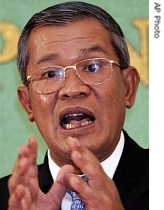-
(单词翻译:双击或拖选)
Tokyo
14 June 2007
Cambodian Prime Minister Hun Sen has welcomed the upcoming trial of surviving Khmer Rouge1 leaders, after Cambodian and international judges agreed on procedural rules that will allow the trial process to begin. Human rights activists2 have previously3 accused the Hun Sen government of placing obstacles in the way of the tribunal. Catherine Makino reports from Tokyo, where Hun Sen is on a visit to seek increased investment in Cambodia.
 |
| Cambodian Prime Minister Hun Sen speaks during a press conference in Tokyo Thursday, 14 June 2007 |
"We always asked countries to start the trial as soon as possible, because Cambodia will not have a bright future unless the problem is resolved and they are punished," he said. "This is what all of the people of Cambodia have been hoping for."
More than 1.7 million Cambodians died under Khmer Rouge rule between 1975 and 1979. Pol Pot, the top leader of the ultra-radical Maoist group, died in 1998, but several of Pol Pot's associates are still living freely in the country.
Hun Sen was a junior-level Khmer Rouge soldier himself, and human rights activists have charged that he and his government have worked behind the scenes to prevent the tribunal from starting its work. Hun Sen has said the proceedings5 could cause panic among Khmer Rouge supporters who still live in Cambodia, and reignite the civil war that ravaged6 the country from 1980s into the 1990s.
He has also said the country could not afford the U.N.-sponsored tribunal, although Japan later stepped in with the needed funds.
On Wednesday, agreement was reached on procedures for the trials after extended negotiations7 between domestic and international judges and lawyers.
The prime minister was unequivocal in his support for the tribunal.
"The Khmer Rouge have to be taken to task for what they did, and we will watch how the international community will have the Khmer Rouge leaders take responsibility for having inflicted8 these atrocities," he added.
The main purpose of Hun Sen's four-day visit to Japan is to seek investment and tourists. Cambodia's infrastructure9 is in tatters after decades of civil war and neglect.
Japan pledged more than $100 million at a donor10's meeting last year, and has been Cambodia's largest donor for years. But Tokyo lags behinds other countries in investment and trade with the Southeast Asian nation.
In his public comments, Hun Sen repeated pledges to reduce corruption11, which has been one obstacle to increased investment.
 收听单词发音
收听单词发音
1
rouge

|
|
| n.胭脂,口红唇膏;v.(在…上)擦口红 | |
参考例句: |
|
|
|
2
activists

|
|
| n.(政治活动的)积极分子,活动家( activist的名词复数 ) | |
参考例句: |
|
|
|
3
previously

|
|
| adv.以前,先前(地) | |
参考例句: |
|
|
|
4
fully

|
|
| adv.完全地,全部地,彻底地;充分地 | |
参考例句: |
|
|
|
5
proceedings

|
|
| n.进程,过程,议程;诉讼(程序);公报 | |
参考例句: |
|
|
|
6
ravaged

|
|
| 毁坏( ravage的过去式和过去分词 ); 蹂躏; 劫掠; 抢劫 | |
参考例句: |
|
|
|
7
negotiations

|
|
| 协商( negotiation的名词复数 ); 谈判; 完成(难事); 通过 | |
参考例句: |
|
|
|
8
inflicted

|
|
| 把…强加给,使承受,遭受( inflict的过去式和过去分词 ) | |
参考例句: |
|
|
|
9
infrastructure

|
|
| n.下部构造,下部组织,基础结构,基础设施 | |
参考例句: |
|
|
|
10
donor

|
|
| n.捐献者;赠送人;(组织、器官等的)供体 | |
参考例句: |
|
|
|
11
corruption

|
|
| n.腐败,堕落,贪污 | |
参考例句: |
|
|
|















